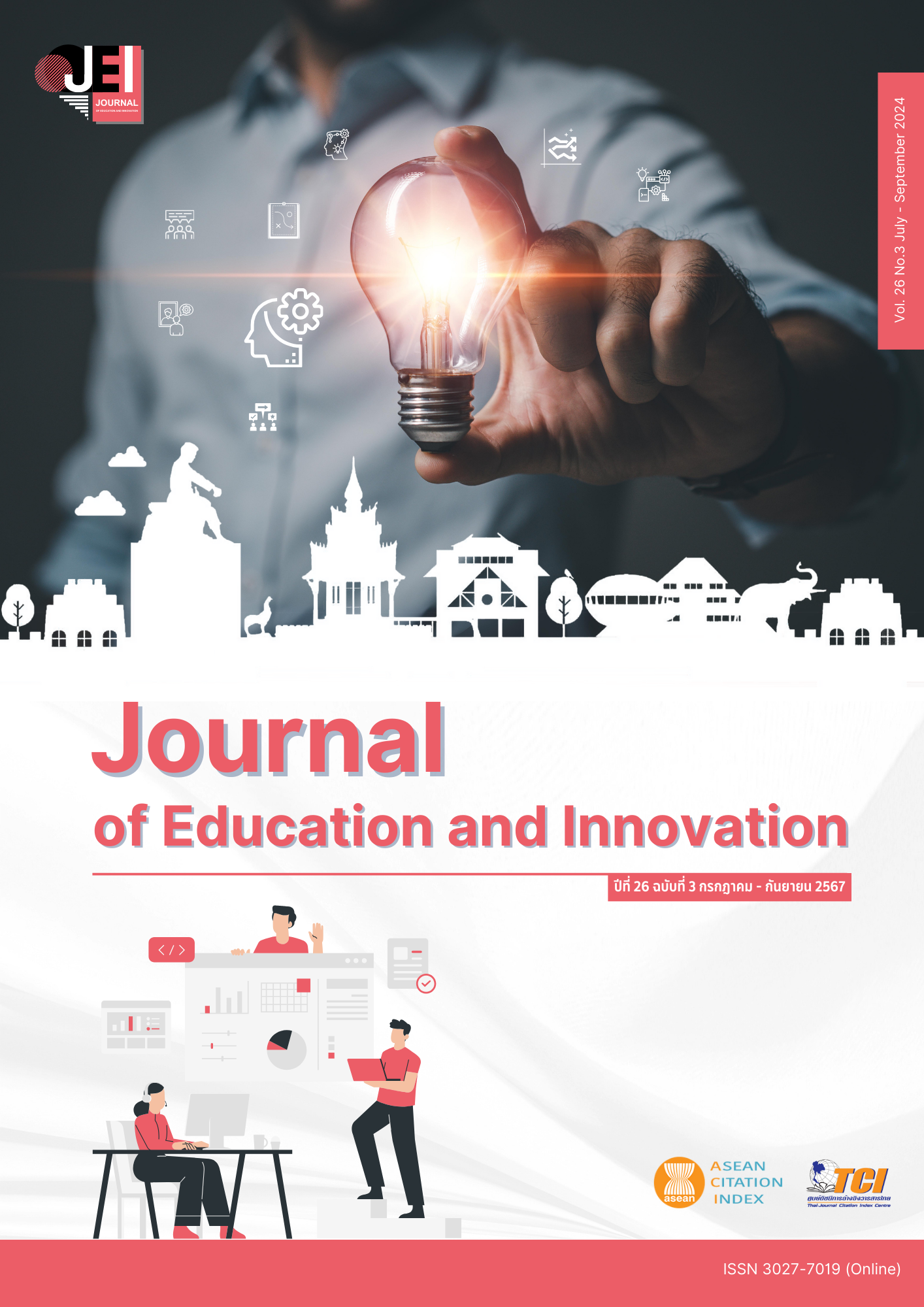THE DEVELOPMENT OF LEARNING MANAGEMENT MODEL TO ENHANCE COMPETENCIES OF PRESERVICE MATHEMATICS TEACHERS
Main Article Content
Abstract
The objectives of the study were: 1) to develop the learning management model to enhance competencies of preservice mathematics teachers and 2) to study the results of the developed model in terms of competencies of the final-year preservice mathematics teachers, in the academic year 2022, Chandrakasem Rajabhat University. The sample was selected using purposive sampling. The research instruments were lesson plans, the test of mathematics competencies, and the questionnaires on opinions about the model. The results of this research were as follows: 1) The learning management model to enhance competencies of preservice mathematics teachers, called 3P3S model, consists of six steps: (1) Preparation; (2) Problem situations; (3) Putting together; (4) Solving problems; (5) Summarizing and decision-making; and (6) Showing knowledge transfer. 2) The results of implementing the developed model showed that: (1) The 3P3S model was effective in enhancing the mathematical competence of pre-service mathematics teachers. The comparison of the pre-test and post-test scores showed that the post-test scores were significantly higher than the pre-test scores at the .05 level. (2) Preservice Mathematics teachers who received teaching and learning according to model had average scores from the test of mathematics competencies during the experiment, classified by competence component and by subject, of more than 60%. (3) The results from opinions on the feasibility of using the 3P3S model showed that most mathematics teachers and instructors had strongly agree of the feasibility of using the 3P3S model. (4) The qualitative analysis of the 3P3S learning model showed that most of the worksheets and mathematics competency tests were evaluated as accurate, complete, and comprehensive. In each step of the 3P3S model, preservice mathematics teachers demonstrated their mathematical competencies. This suggests that the 3P3S model is effective in enhancing all components of mathematical competencies in preservice mathematics teachers.
Article Details

This work is licensed under a Creative Commons Attribution-NonCommercial-NoDerivatives 4.0 International License.
The owner of the article does not copy or violate any of its copyright. If any copyright infringement occurs or prosecution, in any case, the Editorial Board is not involved in all the rights to the owner of the article to be performed.
References
Chaiya, P., Dangprasert, S., & Wiriyanon, T. (2020). The development of instructional model to enhance the competency of mathematical thinking of secondary school students. Technical Education Journal: King Mongkut’s University of Technology North Bangkok, 11(1), 140 – 148.
Cheausuwantavee, C. (2018). Mathematics instruction. Bangkok: Chulalongkorn University Press.
Hajaturus, S. (2021). A study of 21st century learning skills for preservice mathematics teachers. Proceeding of the 3rd National Conference on Educational (pp. 255 – 268). Phetchabun: Phetchabun Rajabhat University.
Jaques, D. (1993). Designing and evaluation courses. New South Wales: Oxford Brooke University.
Kilpatrick, J., Swafford, J., & Findell, B. (2001). Adding it up: Helping Children Learn Mathematics. Washington, DC: National Academy Press.
National Council of Teachers of Mathematics. (2000). Principles and standards for school mathematics. Reston, VA: National Council of Teachers of Mathematics.
National Institute of Educational Testing Services. (2021). Summary of the Basic Education National Test (O-NET) results for the academic year 2021. Retrieved September 11, 2021, from http://www.newonetresult.niets.or.th
Panichsuay, W., Waiboonya, S., Suphkit, P., & Loungkeaw R. (2021). PISA lessons: The new approach of learning process for the elementary students’ competencies. Journal of Community Development Research (Humanities and Social Sciences), 14(4), 157 – 177.
Phaijit, P. (2018). Development of curriculum for professional teacher training preparation to enhance competencies of physical education teacher students (Doctoral dissertation). Bangkok: Chulalongkorn University.
Phuaphan, N., Kijkuakul S., & Chanunan S. (2020). Development of an innovative methods course supporting pre-service science teachers’ technological pedagogical and content knowledge: A critical participatory action research. Journal of Education Naresuan University, 2(24), 159 – 169.
Plangprasopchok, S. (2006). Problems in mathematics teaching and solutions. Journal of the Teaching Profession, 3(31), 78-80.
Phonmak, N. (2022). Context based learning approach in Covid-19 pandemic to promote communication and mathematical meaning communication skills on data analysis and presentation skills of 12th graders (Master independent study). Phitsanulok: Naresuan University.
Reys, R. E., Lindquuist, M. M., Lambdin, D. V., Smith, L. N., & Suydam, M. N. (2003). Helping children learn mathematics. New York: John Wiley and Sons.
Royal Academy of Thailand. (2015). Contemporary educational terminology dictionary of the Royal Academy of Thailand. Bangkok: Royal Academy of Thailand.
Stein, M. K., Smith, M. S., & Henningsen, M. (2009). Orchestrating Productive Mathematical Discussions: A Casebook for Teachers. Portsmouth, NH: Heinemann.
The Institution for the Promotion of Teaching Science and Technology. (2012). Professional mathematics teachers: The path to success. Bangkok: 3-Q Media.
The Institution for the Promotion of Teaching Science and Technology. (2015). Results of the PISA 2015 assessment. Retrieved September 11, 2021, from https://pisathailand.ipst.ac.th/
The Institution for the Promotion of Teaching Science and Technology. (2021). Mathematics competency based learning. Bangkok: Division of Innovative Projects, Institute for the Promotion of Teaching Science and Technology
Thipkong, S. (2002). Mathematics curriculum and instruction. Bangkok: Academic Quality Improvement.
Uaychai, S., Sri-ampai, P., & Wongchuntra, P. (2017). A teacher competency enhancement model based on the coaching processes to increase mathematical reasoning abilities of lower-secondary students. Journal of Education Mahasarakham University, 11(3), 195 – 207.


